 Widok zawartości stron
Widok zawartości stron
 Widok zawartości stron
Widok zawartości stron
 Widok zawartości stron
Widok zawartości stron
John Paul II and the Jagiellonian University
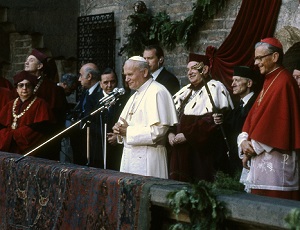
Karol Wojtyła's links with the Jagiellonian University date back to 1938. Shortly after the school leaving exam (Matura), taken on 14 May and passed with flying colours, the future pope became student of Polish Studies at the JU Faculty of Philosophy.
His choice was motivated by his love of theatre and literature and inspired by his teacher Mieczysław Kotlarczyk. Shortly after enrolment, his studies were interrupted by Sonderaktion Krakau – the Nazi German operation against the Jagiellonian University, carried out on 6 November 1939, when many professors were arrested and taken to a concentration camp and the university was shut down. In 1941 Karol Wojtyła and his fellow students founded an underground theatre group named Teatr Rapsodyczny (Rhapsodic Theatre).
From 1 April 1945 to 30 September 1946, he was a junior research assistant at the chairs in dogmatic theology, patrology and history of dogmas at the JU Faculty of Theology. On 24 November 1948 he obtained an MA degree in theology after passing the exams and submitting the thesis on the concept of the means of unification of soul with God in teachings of St. John of the Cross. On 16 December 1948 he became a doctor of theology, on the basis of the PhD thesis Doctrina de fide apud S. Joannem de Cruce (The Doctrine of Faith in St. John of the Cross), successfully defended on 19 June 1948 at the Pontifical Institute Angelicum in Rome. From October 1953 he taught catholic social ethics to 4th and 5th-year students. After the habilitation procedure based on the thesis on Christian ethics according to Max Scheler's system, the Senate of the Jagiellonian University unanimously approved the decision of the Faculty of Theology to confer the title of docent to Rev. Karol Wojtyła. He gave lectures on Catholic social ethics until the end of academic year 1953/54.
The Jagiellonian University remained close to Karol Wojtyła's heart after he became the bishop of Kraków and a cardinal. He also frequently referred to the links with his alma mater after being elected to the Holy See. During his second papal visit to Poland in 1983 he was awarded the JU honorary doctorate at a ceremony in Collegium Maius.
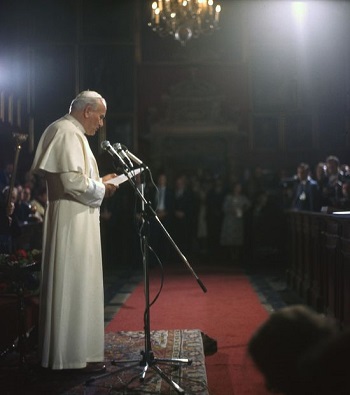 "Like a mother proud of her son's triumph, our alma mater wanted to celebrate the greatness of its student, doctor and docent who became bishop of Rome. A university has no other way of expressing recognition than by conferring an honorary degree. In accordance with the general opinion, our academic community has decided to choose a unique award: the Jagiellonian University doctorate in all arts and sciences", said the then Rector of JU Prof. Józef Gierowski.
"Like a mother proud of her son's triumph, our alma mater wanted to celebrate the greatness of its student, doctor and docent who became bishop of Rome. A university has no other way of expressing recognition than by conferring an honorary degree. In accordance with the general opinion, our academic community has decided to choose a unique award: the Jagiellonian University doctorate in all arts and sciences", said the then Rector of JU Prof. Józef Gierowski.
Expressing his gratitude, John Paul II answered "I cannot conceal that I am deeply moved as I enter the doors of my alma mater. For many years when I lived in Kraków, these historic University buildings were part of my everyday experience. And yet, they have not lost anything from their magnificence and freshness. The greatness of the Jagiellonian University resides in the role it has played in the history of our motherland as well as the culture of Poland, Europe and the entire world. This is how it was seen by its alumnus, Father Piotr Skarga, when he praised the Kraków Academy as a most fortunate foundation of Polish kings and a jewel in their crown. During the 40 years of living in Kraków, close to the Jagiellonian University, I was constantly aware of being close to greatness.
Then the pope presented the Rector with the gifts he brought from Rome: a commemorative medal and a facsimile of the old Ptolemaic cosmology.
On the same day, the Holy Father met with members of the academic community on the courtyard of Collegium Maius, which is commemorated by a plaque on the wall of the building. The place from which the pope spoke is, in turn, marked with a cartouche with the papal coat of arms.
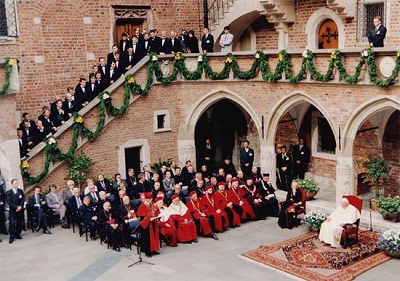 John Paul II paid another visit to the Jagiellonian University during his sixth pastoral visit to Poland. On 8 June 1997 he met with the rectors of Polish higher education institutions in St. Anne's Collegiate Church to mark the 600th anniversary of the JU Faculty of Theology. Then, in Collegium Maius he talked to JU students and professors and listened to a concert.
John Paul II paid another visit to the Jagiellonian University during his sixth pastoral visit to Poland. On 8 June 1997 he met with the rectors of Polish higher education institutions in St. Anne's Collegiate Church to mark the 600th anniversary of the JU Faculty of Theology. Then, in Collegium Maius he talked to JU students and professors and listened to a concert.
The great Jubilee of the year 2000 and the 600th anniversary of the University's renewal provided an occasion for a pilgrimage to Rome, which culminated in a meeting of nearly 400 members of the academic community with John Paul II on September 11 in Paul VI Audience Hall. During the audience with the pope, JU Rector Prof. Franciszek Ziejka presented the Holy Father with books published to mark the university's jubilee and read out the solemn address from the academic community. The pope spoke to the pilgrims and gave the Jagiellonian University a blessing for the next 100 years.
"The thought about the Jagiellonian University brings back my memories from before the war as well as more recent ones, such as our meeting in St. Anne's Collegiate Church and Collegium Maius in 1997. It also reminds me of professors and students who have shaped the past and present of my alma mater. What makes recollecting the past even more relevant is the fact that we still breathe the atmosphere of the 600th anniversary of the Jagiellonian foundation and the renewal of the University."
Another meeting with the academic community took place during the last, eighth pastoral visit of John Paul II to Poland. On 17 August 2002, on his way from the Divine Mercy Sanctuary in Łagiewniki to the Bishop's Palace, he passed near the new JU Campus, which was still under construction and stopped at the library of the Pontifical Academy of Theology (PAT), which was being built nearby. The combined academic choirs of both universities sang the song "Gaude Matere Polonia", which was followed by addresses by the Rector of PAT Bishop Prof. Tadeusz Pieronek and the JU Rector Prof. Franciszek Ziejka. The Pope addressed 2 thousand members of Polish academia – rectors, professors, students and administrative staff – who gathered there, greeted them, thanked them for their presence, and said that he always remembered them in his prayers. He was presented with the Golden Book - the JU history chronicle marking the 600th anniversary of the University's renewal.
John Paul II passed away on 2 April 2005. As a pope, he had never forgotten about his alma mater and stressed his attachment to it on many different occasions. During his pastoral ministry, he also beatified and then canonised two persons who played a very important role in the university's history: Queen Jadwiga and Prof. Józef Sebastian Pelczar.
On the eve of John Paul II's canonisation, the screening of My Alma Mater - a documentary about Karol Wojtyła's links to the Jagiellonain University – was held in Collegium Maius Assembly Hall. The film, originally aimed to be a present for the pope, became an interesting historical document. Its authors managed to interview all living college friends of Karol Wojtyła. They also obtained a number of unique, previously unknown, materials from archives as well as individuals. The screening was accompanied by Prof. Franciszek Ziejka's lecture on the little known details related to the conferment of an honorary doctorate upon John Paul II and a presentation of items related to the Pope from the JU Museum collection.
in-text photos: JU Museum Archive
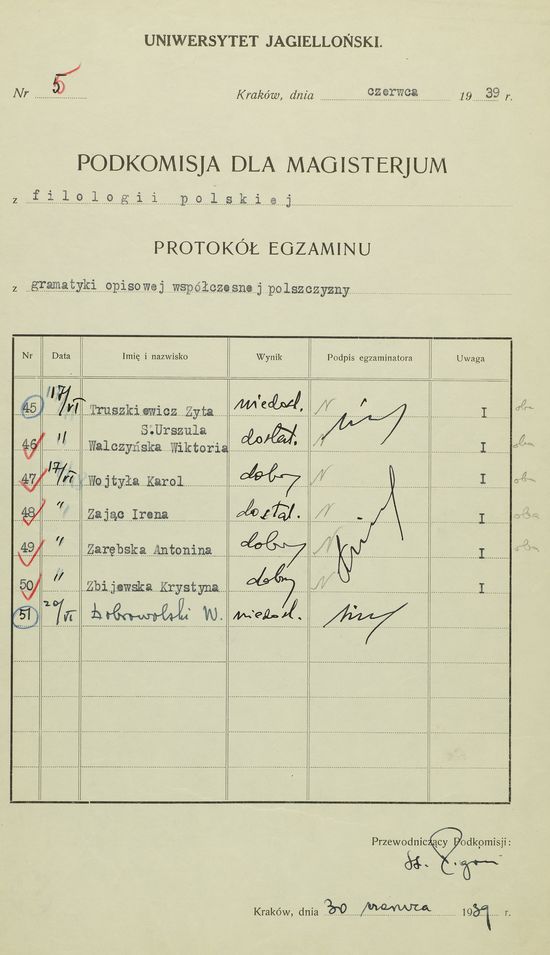
Karol Wojtyła's examination form (JU Archive)
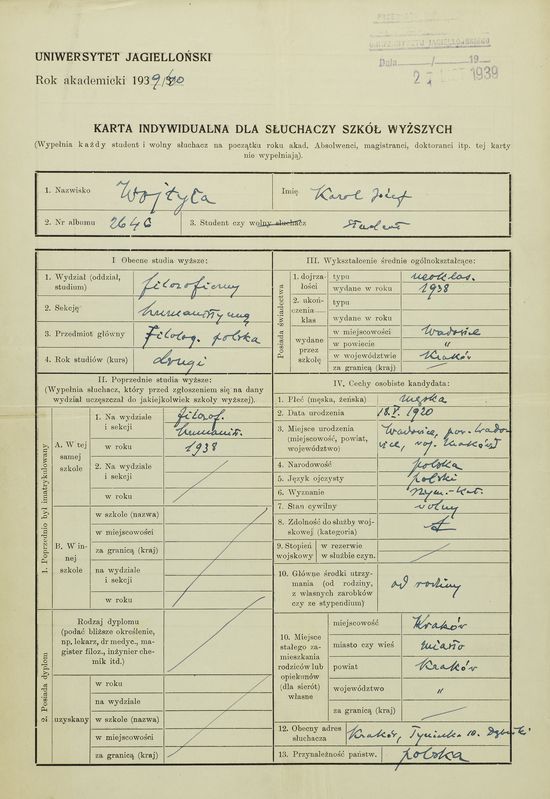
Karol Wojtyła's higher education student's card (JU Archive)
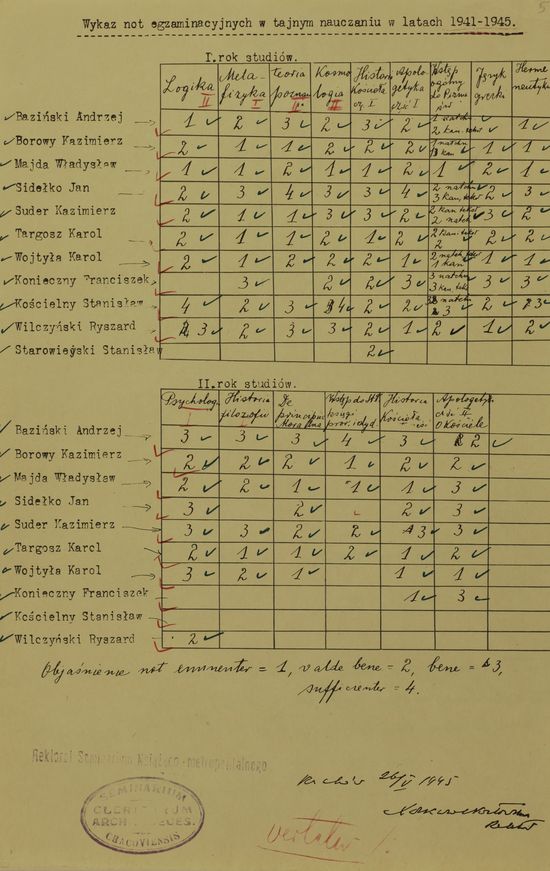
List of Karol Wojtyła's marks in clandestine teaching examinations (JU Archive)
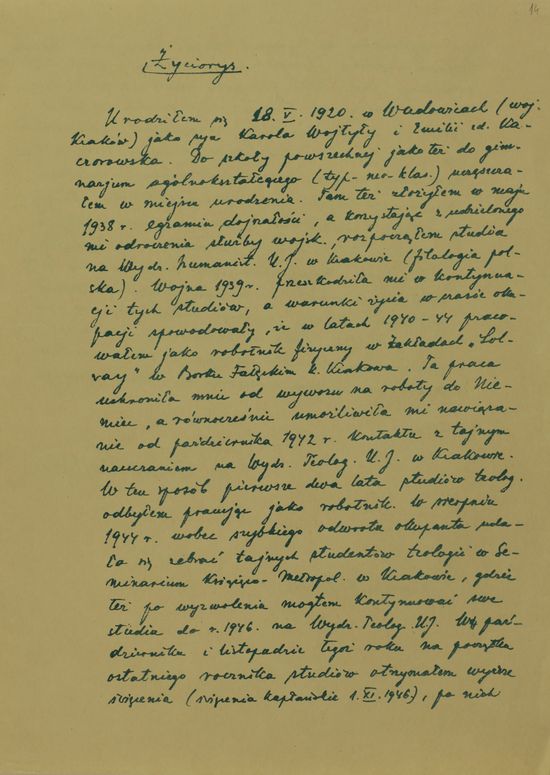
Karol Wojtyła's Curriculum Vitae (JU Archive)
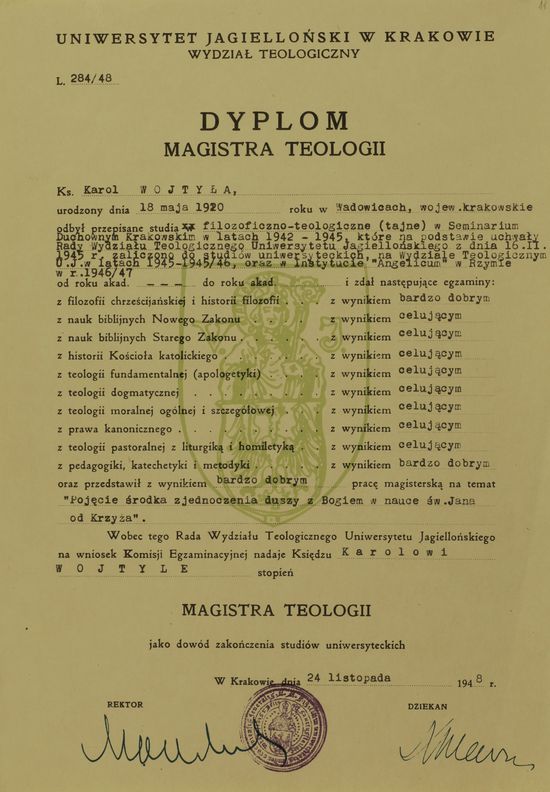
Karol Wojtyła's MA Diploma in Theology (JU Archive)




